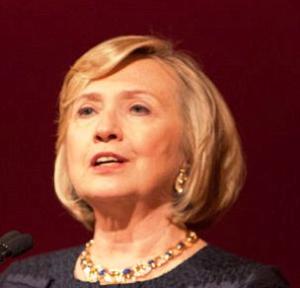A pair of potential presidential contenders speak out on marijuana, five New England governors meet on the opiate issue, New York cops are starting to be trained to use the overdose reversal drug naloxone, New York's governor makes passage of medical marijuana there iffy, the Dutch high court rules cities can ban foreigners from cannabis coffee shops, and more. Let's get to it:

Hillary Clinton Evolves on Marijuana Policy. In an interview with CNN international correspondent Christiane Amanpour Tuesday, former First Lady and Secretary of State Hillary Clinton said she favors medical marijuana for people who are in "extreme medical conditions" and is willing to "wait and see" how recreational pot works in Colorado and Washington state. "On recreational, states are the laboratories of democracy," Clinton said. "We have at least two states that are experimenting with that right now. I want to wait and see what the evidence is." That's a step forward for Clinton, who in 2008 opposed marijuana decriminalization and who in 2012 said she doubted drug legalization would end black market violence in Central America.
Chris Christie Doesn't. New Jersey Gov. Chris Christie (R) said Monday night that medical marijuana is "a front for legalization" and suggested that -- unlike every other industry in the United States -- medical marijuana providers should not be concerned with making money. His remarks came in response to criticism of his management of the state's highly-regulated medical marijuana program. Christie has said repeatedly that he opposes legalization, and that it won't happen "on my watch."
No Legalization Initiative for Arizona This Year. A Safer Arizona campaign to get its legalization initiative on the November ballot is over after the campaign came up well short in its signature-gathering efforts. The group needed 250,000 signatures to qualify, but said it only had about a third of that number. They are vowing to be back in 2016.
Delaware Decriminalization Bill to Get Hearing Tomorrow. The House Public Safety and Homeland Security Committee will hold a hearing on a decriminalization bill tomorrow. House Bill 371, sponsored by Rep. Helene Keeley (D-Wilmington), would make possession of less than an ounce a civil infraction punishable by a fine. Under current law, possession of any amount is a misdemeanor punishable by up to six months in jail.
Medical Marijuana
New York Governor Rejects Medical Marijuana Bill, Demands No Smoking. Gov. Andrew Cuomo (D) has rejected the Compassionate Use Act just two days before the state's legislative session ends. Legislators are working to revise the bill in a manner acceptable to Cuomo, and he has signaled he was willing to waive legislative rules to allow a late bill to be introduced.
Opiates
New England Governors Meet to Address Opiates. The five governors of the New England states (except for Maine, whose Republican governor, Paul LePage didn't attend) met yesterday to address rising drug overdoses and agreed to cooperate on the cross-state monitoring of prescription drug monitoring and to expand drug treatment. They said they would try to make prescription monitoring mandatory and would try to curb "doctor shopping." The governors had nothing to say about ensuring that patients with legitimate needs for pain medications are able to get access to them.
Harm Reduction
New York Cops Get Training in Using Overdose Reversal Drug. By the end of this week, more than 600 New York state police officers and sheriff's deputies will have received the necessary training to carry and administer naloxone (Narcan), the opiate overdose reversal drug. The state has pledged to make the life-saving drug available to police officers across the state, and the program is just being rolled out now.
International
Myanmar's 15-Year Opium Eradication Effort a Failure, Government Minister Says. A Myanmar Home Affairs minister told parliament Monday that the country's 15-year effort to wipe out opium poppies had failed, and that the government would extend it for another five years. Brigadier General Kyaw Kyaw Tun said poppy crops had declined until 2006, but had been on the rise since then. It has been increasing at a rate of more than 10% a year in the past several years, he said. Myanmar is the world's second largest opium producer, although it trails far behind world leader Afghanistan in output.
Canada Prescription Opiate Overdoses on the Increase, New Report Says. Overdose deaths from prescription opiates have "risen sharply" and now account for about half of all drug-related deaths in the country, the Canadian Drug Policy Coalition said in a report released Monday. The report, Getting to Tomorrow: A Report on Canadian Drug Policy, calls for harm reduction measures and a public health approach to reduce overdose deaths.
Dutch High Court Decides Local Councils Can Ban Foreigners From Cannabis Coffee Shops. The Dutch Council of State, the country's highest court, has ruled that municipalities have the ability to bar people who are non-residents from the country's famous cannabis cafes. The aims of preventing drug tourism and combating organized crime are sufficient to allow discrimination based on nationality, the court ruled. The ruling comes in the case of coffee shop owners in the border towns of Maastrict and Limburg, where councilors had closed coffee shops for selling to tourists. Most other municipalities have not moved to ban foreigners. Read the advisory opinion here.
This work by StoptheDrugWar.org is licensed under Creative Commons Attribution-ShareAlike 4.0 International
Add new comment